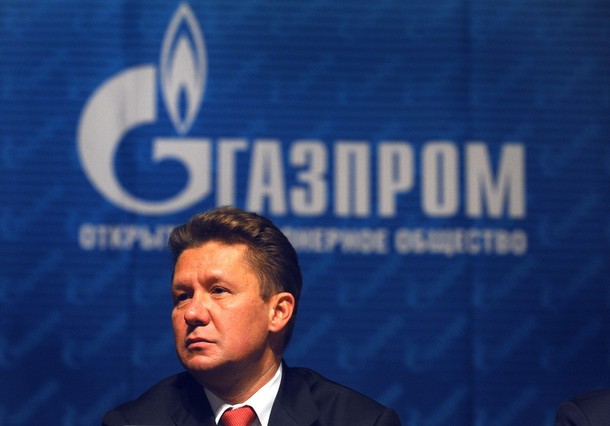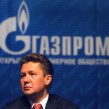
Gazprom Stays the Course Under Putin’s “Manual Management”
Publication: Eurasia Daily Monitor Volume: 6 Issue: 124
By:

Russian energy super-giant Gazprom has taken severe blows in the still-deepening recession, and the worst setbacks have happened in its most profitable market – the European Union. Various assessments show that the volume of its export to Europe shrunk by 35-40 percent in the first four months of this year, and consequently its market share fell from 31 percent to 16 percent, while the forecast for export revenues in 2009 is some 40 percent below the previous year (Kommersant, June 25). Nevertheless, at the annual meeting last week Gazprom’s CEO Aleksei Miller, confidently asserted that the lowest point of the decline had passed (www.gazeta.ru, RIA-Novosti, June 26). He dismissed the criticism over inflexible price policy and predicted that E.U. consumers would resume their normal demand for Russian gas, while the market expectations for the price of oil in 2010 shifted, in his opinion, towards the benchmark of $100 per barrel.
Falling revenues determined, nevertheless, some changes in Gazprom’s guidelines, one of which involved cutting the dividends for 2008 by as much as 85 percent, which essentially means less money for the state budget -since the government is the majority shareholder (Vedomosti, June 25). Another alteration is the reduction of the investment program, perhaps by as much as 30-35 percent, but on that few details are released. Production plans for the huge Bovanenkovskoe field has been corrected towards the end of 2012, but Miller confirmed that the Shtokman project remained on track (RIA-Novosti, June 26; Kommersant, June 17). He also insisted that the South Stream pipeline faced no delays and would carry up to 35 percent of Russian gas export to Europe after 2015. In reality, however, Shtokman most probably will need re-scheduling towards 2015, while the prospects for the South Stream remain very uncertain.
One person who was noticeably absent from the "united-we-stand" gathering was Prime Minister Vladimir Putin, who is known for treating Gazprom’s business very much like his own. His presence was strongly felt in the re-appointments of his loyal ally Miller as well as his more recent protégé Deputy Prime Minister Viktor Zubkov as the chairmen of the board and even in the appearance of a new "independent" in Gazprom’s list of directors – Valery Musin, a professor of law from St. Petersburg University and Putin’s former teacher (www.newsru.com, June 26). Putin has clearly not lost interest in gas matters, as shown by his meeting with Total’s CEO Christophe de Margerie, who spared no praise for Putin’s "instructions" about doing business in Russia and was duly rewarded with a contract for the joint development of a medium size gas field in western Siberia (Kommersant, June 25).
Duties of prime ministers are certainly complex, but few apart from Putin have taken to making blitz appearances in unexpected places and performing small miracles by reviving paralyzed plants. It started in the small town of Pikalevo, Leningrad oblast earlier this month where TV crews arrived just in time to show Putin stepping out of the helicopter, making a brief tour around the empty enterprises and forcing the owners to strike a deal to re-start production, not even leaving them the pen with which the contract was signed as a souvenir (Nezavisimaya Gazeta, June 11). Then came the visit to Barnaul where the prime minister inspected the foundation of a new medical center, but the mere fact of his presence in Altai krai was enough to resolve the labor conflict at the Rubtsovsk tractor plant that suddenly saw demand from new customers (Kommersant, June 20). After the visit to Ilya Glazunov’s personal art gallery where the artist was eagerly attentive to the prime-ministerial advice, some commentators started to worry about Putin’s connection with reality (Ezhednevny Zhurnal, June 16). Last week he paid a surprise visit to a super-market in Moscow and expressed dissatisfaction with meat prices, accepting reassurances that they would be immediately revised down (Vremya Novostei, June 25). Yuri Kobaladze, the executive director of the company that owns the chain (and a former general from the Foreign Intelligence Service) had the nerve to clarify later that it was only light hearted, but July sales were nevertheless duly announced (Moscow Echo, June 25).
The resemblance of this "manual management" to the trademark style of North Korean "great-and-dear" leaders is more than a little amusing (www.grani.ru, June 26). The public relations effect from such attention to local problems is inevitably short-term, but it creates an increasing demand for quick fixes of such complex problems as, for instance, the stagnation of the "mono-cities" built around one or several industrial enterprises (Rossiyskaya Gazeta, June 26). The simple proposition that the depth of economic decline requires serious reforms in the overloaded system of bureaucratic rent-extraction from every business activity is not present in the recently revised anti-crisis program. The "ideology" of this plan boils down to the expectation that rising oil prices will restart the growth engine that worked so wonderfully during Putin’s presidency, while the hands-on tackling of some local situations will help in defusing public protests.
Gazprom is both a tool and a victim of this "it-will-pass" policy that has already transformed the crisis into stagflation. Putin’s micro-management of the company’s activities is never advertised, but his hand is unmistakable in the brinksmanship tactics that defines the development of parallel gas conflicts with Ukraine and Belarus. Compromises in these quarrels are always only a means toward the end of denying them any independent say in gas matters. Putin quite sincerely does not see how this tough behavior damages Gazprom’s reputation in Europe, much the same way as he cannot grasp the logic of the diminishing effectiveness of performance by this overgrown corporate behemoth under his enlightened guidance. Gazprom is allowed to reduce its contributions to the state budget and is granted permission to increase prices for domestic consumers despite their diminishing incomes, its every acquisition or investment in Europe is backed by all the necessary foreign policy resources – and it is still in far more trouble than its glossy annual report admits. Every crisis brings reinvigoration to businesses that can learn, but Putin remains adamant that his course has always been faultless.




